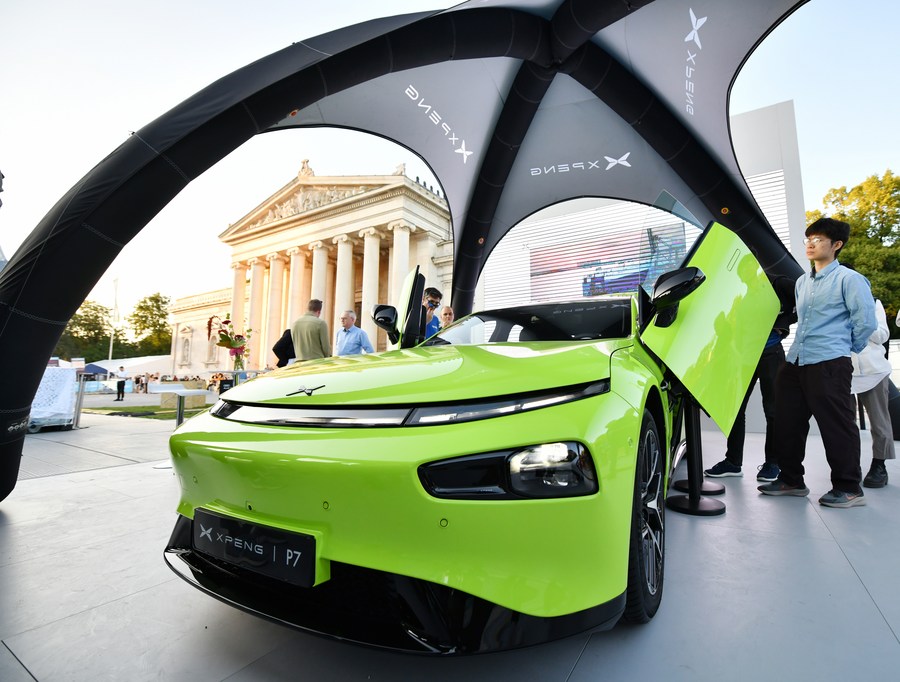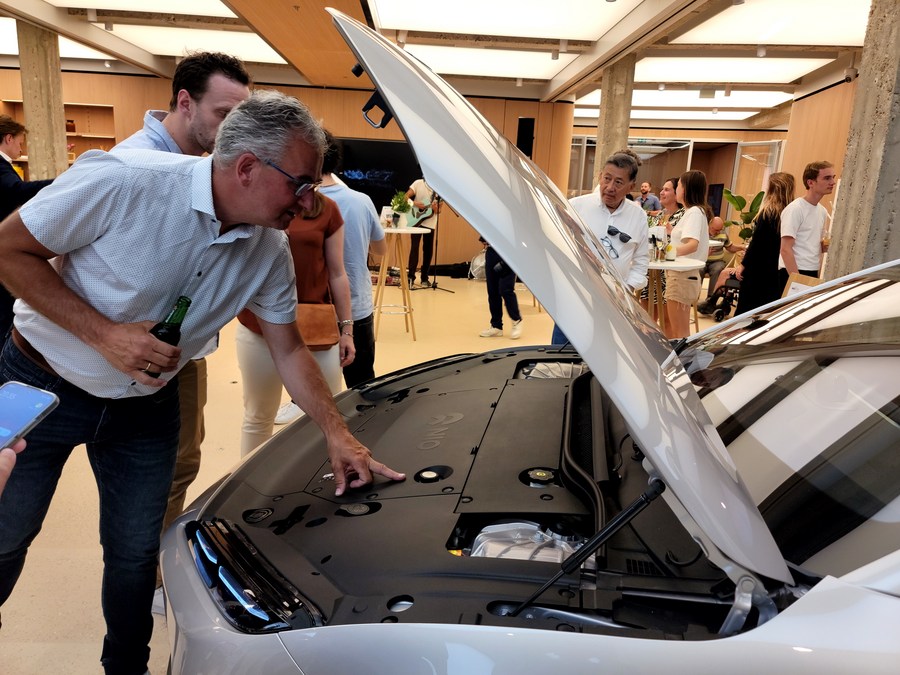BRUSSELS, Dec. 17 (Xinhua) — With high quality, innovative designs, and competitive prices, Chinese electric vehicle (EV) brands such as BYD, NIO, Xpeng, Hongqi and Lynk &Co are increasingly winning the hearts and minds of European consumers.
Statistics from the European Automobile Manufacturers’ Association (ACEA) show that Chinese brands account for almost 4 percent of European Union (EU) battery-electric car sales in 2022, up from 0.4 percent just three years ago. The EU imported over half a million Chinese-made cars in 2022, of which around 63 percent were battery-electric.
As Chinese EVs move into the fast lane in Europe, collaboration in the industry from both sides has also intensified. Industry analysts and executives said that with their respective advantages, the closer China-Europe EV collaboration would further benefit consumers and industries, and create new areas for China-EU cooperation.


People visit the BYD booth at the 2023 International Motor Show, officially known as the IAA MOBILITY 2023, in Munich, Germany, Sept. 8, 2023. (Xinhua/Zhang Fan)
SUPERB USER EXPERIENCE
At Frihamnen, a busy port area in Stockholm, Sweden, Johan Lind, a Swede, sips coffee in his NIO ET7 as the vehicle is ported in a box that looks like it came out of a science fiction novel — NIO’s third-generation power swap station (PSS).
The length of this experience, about three minutes, may look no different from filling up the tank at any petrol station, but the magic that is happening inside amazes most European EV lovers — hands-free, the vehicle undergoes an automatic battery swap and electric system checks before it is ready to hit the road again.
“It’s really fantastic!” said Lind, who has had the vehicle for almost a year. Impressed with NIO’s power swap services the most, he said the swap stations are “a good and easy way to charge the car very fast and efficiently.”
With such unique battery swap technology, NIO has made a rapid entry into the German, Dutch, Swedish and Danish markets since its debut in the European market via Norway in 2021.
In The Hague, the Netherlands, earlier this year, Ben Malawau, a Dutchman, already owned a BYD Atto 3 car, whose advanced battery technology, performance, features and value for the money greatly impressed him.
“We enjoy the car because of the large screen on the dashboard … All the things are in place, it’s very easy, very comfortable to drive,” said Malawau, describing the model as offering “better quality and functionality” at a “cheaper price,” and is loved by the whole family.
“When European consumers come into contact with some Chinese EV products, they will find that compared with similar European products, the quality and specifications of Chinese EVs are much higher. This surprises European consumers,” Spiros Fotinos, CEO of ZEEKR Europe, told Xinhua.
If customers were attracted by the competitive prices Chinese EVs offered before, they are now attracted by “an all-round experience,” Mathias Hagelund, retail marketing manager at Xpeng Motors Denmark, told Xinhua.
TECHNOLOGICAL EDGES
Experts believe that advanced technologies, higher availability and better configuration are the main reasons for the success of Chinese EVs as consumers favor cleaner and smarter vehicles and that China’s key technologies in pure electric vehicle platforms, power batteries, and third-generation semiconductors outperform those of the United States and Europe.


People visit the booth of Chinese carmaker Xpeng during the 2023 International Motor Show, officially known as the IAA MOBILITY 2023, in Munich, Germany, Sept. 5, 2023. (Xinhua/Ren Pengfei)
Chinese EV companies filed 41,011 patent applications in areas related to EV charging and battery swapping from 2010 to 2022, far ahead of any other country globally, according to Tokyo-based analytics company Patent Result.
Peter Fintl, vice president of technology and innovation at Capgemini Engineering, believed that in terms of rapid progress in electric vehicles, battery size, cost, or overall efficiency, many Chinese brands have really been the ones to set the pace.
NIO said its Power Swap service, enabled by over 1,600 patented technologies, offers automatic battery and electric system checks during each swap to keep both the vehicle and battery in the best shape. Unlike traditional EVs that require lengthy charging times, this charging experience only requires around three minutes.
David Holmbom, power network development lead at NIO Sweden, told Xinhua that the company is installing PSSs in a network that connects three Swedish major cities — Stockholm, Gothenburg, and Malmo — and with 200 km in between the stations, EV drivers won’t have “range anxiety.”
In September, at the 2023 International Motor Show (IAA) in Munich, Germany, China’s EV battery maker Contemporary Amperex Technology Co., Ltd. (CATL) presented a new lithium iron phosphate (LFP) battery that can power 400 km of driving range with a 10-minute charge, making fast-charging technologies more affordable to consumers.
“We hope this battery could become a new standard for the industry,” said CATL cell design engineer Gao Pengfei, adding that European EV manufacturers have been interested in CATL’s new technologies, which could enhance their competitiveness in this rapidly developing industry.
Recognizing the advantages of Chinese automakers, such as their rapid tech innovation and software development, as well as their early entry into the EV sector, Ferdinand Dudenhoeffer, director of the Germany-based CAR Center Automotive Research Duisburg, believed that “in the next five to ten years, a lot of Chinese electric vehicles and new energy vehicles will populate Europe’s roads.”
EUROPE-CHINA SYNERGY
The auto industry, with an increasingly in-depth cross-integration of technology and supply chains, is a highly globalized industry that demands international cooperation.
Experts point out that China and Europe are highly complementary and have their own characteristics in terms of technology, production capacity, and supply chains.


People look at an EL6 electric vehicle launched by Chinese electric car manufacturer NIO in Rotterdam, the Netherlands, June 15, 2023. (Xinhua/Wang Xiangjiang)
Such win-win cooperation will see traditional European auto companies speed up their electrification process, while Chinese EV makers would expand their global market in the process.
BYD, in partnership with local collaborators, has already entered 15 European countries, including Britain, Germany, France, Italy, and Spain, while XPeng combines direct sales with local agency collaboration for sales and services. NIO is reportedly considering partnering with dealers in Europe to boost sales. The battery giant CATL, after becoming a supplier to BMW soon after its founding in 2011, has cooperated with companies including Volkswagen, Mercedes-Benz, and PSA ever since.
While Chinese EV companies and battery producers expand their market share in Europe, major European players rush to cooperate with their Chinese partners to achieve bigger synergy.
In July, the Volkswagen Group strengthened its presence in China with the acquisition of a 4.99 percent stake in local EV startup XPeng. Meanwhile, the carmaker’s luxury brand Audi further expanded its cooperation with its Chinese joint venture partner SAIC.
Later in October, Stellantis, a multinational auto company headquartered in Amsterdam, the Netherlands, announced the acquisition of 20 percent of the shares of Chinese EV maker Leapmotor. The deal outlines the formation of a 51/49 Stellantis-led joint venture that gives Stellantis “exclusive rights for the export and sale, as well as manufacturing, of Leapmotor products outside Greater China.”
“We will combine our experience, our knowledge with new technologies being developed in China. This combination will make us so special. We have our heritage, and we will integrate these new technologies into our well-known products,” Oliver Blume, CEO of Volkswagen Group, told Xinhua.
German auto parts and components supplier ZF Group, while doubling down on China, also sees new opportunities for cooperation with Chinese carmakers who seek to establish themselves in the European market, ZF Group CEO Holger Klein said. “ZF would like to cooperate along the full spectrum of products we have,” he added.











